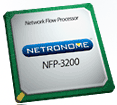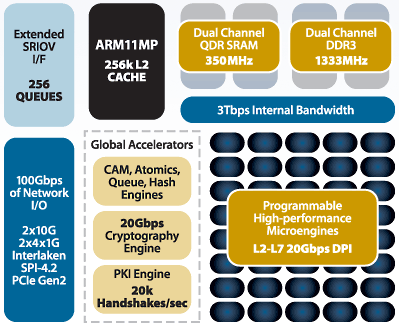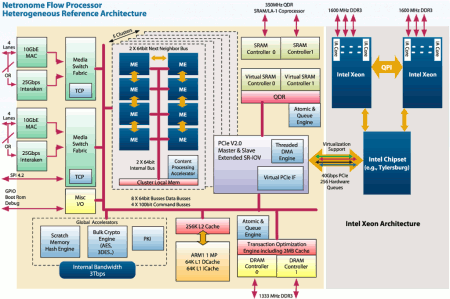Linux-ready networking SoCs scale to 40 cores
May 27, 2009 — by Eric Brown — from the LinuxDevices Archive — 40 views Netronome announced new multi-core “network flow processors” that are backward-compatible with Intel's IXP28xx, but claimed to offer over twice the MIPS. The Linux-compatible NFP-32xx system-on-chips scale from 16 to 40 cores, offer 20Gbps throughput, and provide a programmable dataplane, virtualization, and security… processing, says the company.
Netronome announced new multi-core “network flow processors” that are backward-compatible with Intel's IXP28xx, but claimed to offer over twice the MIPS. The Linux-compatible NFP-32xx system-on-chips scale from 16 to 40 cores, offer 20Gbps throughput, and provide a programmable dataplane, virtualization, and security… processing, says the company.
In November 2007, Netronome and Intel signed a multi-part licensing agreement giving Netronome the right to market and support Intel's top-of-the-line IXP28xx network processor family through 2012. Launched in 2002, the IXP28xx line has evolved to combine application processing cores with multiple “MicroEngine” co-processors, and supported bandwidth of up to 10Gbps. The 2007 agreement also called for Netronome to design and build next-generation IXP28xx chips with 10-100Gbps of bandwidth.
The first 20Gbps generation has now arrived with the NFP-32xx system-on-chips (SoCs), which claim backward compatibility to the IXP28xx, but have upgraded to an ARM11 core. The new SoCs target server virtualization and networking applications, such as high-performance line cards that require intelligent packet processing.

NFP-32xx architecture
Incorporating up to 40 multi-threaded programmable networking cores running at 1.0GHz or 1.4GHz, the NFP SoCs deliver over 56 billion instructions per second, with 320 hardware threads, enabling 1800 instructions per packet at 30 million packets per second, claims Netronome. As a result, the NFP allows for 20Gbps of L2-L7 deep packet processing with line-rate security and I/O virtualization, says the company. The SoCs are said to consume only 15 to 35 Watts.
The NFP (Network Flow Processor) is touted as being programmable and “capable of addressing the increasingly complex requirements of unified computing architectures.” With its software-defined I/O, the SoC is said to support both L2-L3 packet processing and L4-L7 application- and content-aware deep packet inspection. As a result, companies can replace dedicated hardware for FCoE HBAs, iSCSI, TOE, and other functions with programmable firmware implementations, says the company. In addition, the programmable environment enables virtual switches, load balancers, and firewalls to be implemented.
As shown in the reference architecture example below, the processors can be deployed to work in tandem with Intel's Xeon and other processors, combining “the NFP's high-performance network, content and security processing with general purpose processors, such as Intel's IA, through I/O virtualization,” says Netronome.

Heterogeneous reference architecture coupling the NFP-32xx with general-purpose multicore Intel Xeon CPUs
Source: Netronome
(Click to enlarge)
The NFP-32xx offers a PCIe v2.0 implementation, including “extended SR-IOV with 256 queues” for providing guaranteed bandwidth and low latency access to shared I/O, says the company. The SR-IOV drivers are said to include configurable algorithms for load balancing to virtualized multi-core CPUs and “efficient zero-copy mechanisms that significantly improve CPU, memory and system bandwidth utilization.” The NFP is said to support eight PCIe lanes, as well as high-speed network interfaces including dual 25Gbps Interlaken, SPI-4.2, and dual 10Gbps XAUI.
The NFP is said to offer 20Gbps of line rate security processing with dataplane hardware acceleration, including:
- Optional cryptography engines, with support for RC4, 3DES, AES, SHA-1, and SHA-2
- PKI engines to accelerate modular exponentiation with up to 2048-bit keys
- 3.5 billion 64-bit hashes per second for security, regular expression, and de-duplication
- Dedicated hardware for true random number generation
- Support for in-line and look-aside security processing designs
The NFP is also said to offer hardware features that support parallel programming, including:
- CAM instructions for determining inter-thread dependencies
- 44Gbps of next-neighbor interconnects
- 3Tbps of switched internal data-bus bandwidth
- ECC on all memory busses
- Local timers and CRC engines
- Atomic memory engines
- Queue manager for traffic management
Linux reference platform on the way
Netronome is in the process of developing an NFP-3200 Customer Reference Platform (CRP) with a Board Support Package (BSP) “for non-commercial Linux,” said a company spokesperson in an email. In addition, “Netronome has a number of customers requesting support for WindRiver VxWorks and MontaVista Linux, and they are working with them on that front,” added the spokesperson.
Previous Netronome products, such as its Netronome Flow Engine (NFE) line card, have been supported with MontaVista Linux. Netronome's Octeon II networking SoCs, as well as RMI, which recently introduced a new PowerPC-based XLC family of processors. Another massively multi-core rival in the carrier-grade and server arenas is Tilera, which recently introduced an upgraded TilePro family of MIPS/RISC SoCs. One advantage for Netronome: The 2007 agreement called for the new NFP processors to be co-marketed by Intel and Netronome, which will continue to offer them in the form of chipsets, boards, and appliances.
Stated Rose Schooler, GM, Performance Products Division, Intel's Embedded Computing Group, “The NFP provides existing IXP28XX customers with a path forward for the evolution of their high-performance product designs.”
Stated Peder Jungck, founder and CTO at CloudShield Technologies, “The NFP's massively parallel microengine architecture has unique advantages over traditional technologies.”
Stated Simon Crosby, CTO of the Virtualization and Management Division at Citrix Systems, “XenServer can take advantage of the NFP to deliver greater I/O performance with per-VM QoS guarantees while enforcing multi-tenancy, per-VM ACL policies and security functions.”
Stated Bob Wheeler, senior analyst at The Linley Group, “With such a large base of existing IXP28XX customers, the Netronome NFP is well positioned to intercept the convergence of the network and data center.”
Availability
The NFP-32xx processors are now available for sampling, with general availability in the third quarter, says Netronome. Prices start at $275, with performance options spanning from 16 to 40 cores operating at 1.0 or 1.4GHz, with optional cryptography support. More information may be found here.
This article was originally published on LinuxDevices.com and has been donated to the open source community by QuinStreet Inc. Please visit LinuxToday.com for up-to-date news and articles about Linux and open source.